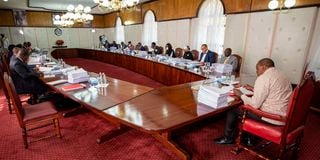Premium
Why it is a tough call for Ruto to appoint Cabinet

Former President Uhuru Kenyatta (right) chairs a Cabinet meeting at State House in Nairobi in May.
The decision to retain chief administrative secretary (CAS) posts and extend the application deadline for principal secretary positions points to the competing interests President William Ruto is grappling with in forming his Cabinet.
The President, who is expected to name his Cabinet any time upon return from the United States, has indicated that he is keen to have an all-inclusive albeit expanded executive.
The position of CAS, which was introduced by former President Kenyatta four years ago, has previously been filled up with election losers and establishment allies.
Pre-election pacts
Ruto allies say the need to strike a balance between fulfilling pre-election pacts, ensuring merit prevails and ensuring regional and gender balancing are among the factors that have delayed the naming of the Cabinet and other top government officials.
The Nation has established that the Head of State had planned to name his Cabinet on Sunday before leaving for the United Kingdom to attend the burial of Queen Elizabeth II, but plans changed as there was a need to fine-tune the list in light of the pledge to have women forming half the Cabinet.
A source in President Ruto’s inner circle yesterday told the Nation that determining which dockets should go to which region is another issue.
For instance, the Mt Kenya region, which accounted for 42 per cent of Dr Ruto’s total vote, has expectations that the President and his deputy Rigathi Gachagua have to consider and manage.
The President and his key advisers also have to balance between rewarding those who stood with them since the start of his irreconcilable differences with his then boss Uhuru Kenyatta and embracing the political ‘johnnie comelatelies’, mainly politicians who switched loyalty from Azimio la Umoja One Kenya Coalition Party after Kenya Kwanza Alliance was declared winner.
For, while these post-poll defectors did not help Dr Ruto’s camp in the gruelling presidential campaigns, their support is critical to shoring up the numbers in Parliament to push the government’s legislative agenda.
The defectors will also be critical in resolving knotty issues such as the current standoff between the two main political formations on which side constitutes the majority in the National Assembly.
The need to accommodate the latter group is believed to be part of the reason the Public Service Commission (PSC) extended the application deadline for PSs’ slots from last Tuesday to next week.
According to PSC boss Simon Rotich, the extension will offer interested applicants time to submit their applications.
PSC is expected to recommend to the President people to be appointed. The President will then nominate candidates and forward the list to Parliament for approval. Currently, there are 44 principal secretaries serving in different state departments.
To gain more wiggle room in the appointments, Dr Ruto is likely to bring back the CAS positions. He, however, has to seek public participation in creating the controversial posts.
“The President has proposed to establish the offices of Chief Administrative Secretary, which will be offices in the public service and will be under the direction of Cabinet Secretaries,” PSC Chairperson Anthony Muchiri said on Wednesday.
Unlike in the Kenyatta administration when CAS nominees were never subjected to a competitive recruitment, the candidates will this time face interviewers.
“The commission will recommend persons to hold the position of Chief Administrative Secretary for appointment through a competitive recruitment process that shall culminate in nomination by the President and vetting by the National Assembly,” said the PSC chairman in a statement released to newsrooms.
Yesterday, Belgut MP Nelson Koech said the CAS position would help the President have “the face of Kenya” in his government.
“It’s not enough to only have 22 Cabinet secretaries especially when you want the face of Kenya in the executive. Tell me how you would accommodate 42 tribes in 22 positions,” said Mr Koech, who went on to defend the decision to delay Cabinet appointments.
“Even if he was in a hurry to name the Cabinet, who would have vetted the candidates? Induction of members [of the National Assembly] is underway,” he added.
Disrupt operations
Last April, High Court declared Mr Kenyatta’s appointment of 29 CASs unconstitutional. Justice Anthony Mrima later suspended the order, saying, it would disrupt the operations of ministries during the coronavirus pandemic.
Three months later, in July, Attorney-General Paul Kihara Kariuki secured a temporary relief when the Court of Appeal suspended implementation of the High Court judgment that declared the President’s decision unconstitutional.
“It is our finding that, although there is already an inbuilt stay granted by the trial court, public interest underpinning the substratum of the intended appeal would demand that we affirm the interim orders,” ruled justices Roselyne Nambuye, Wanjiru Karanja and Agnes Murgor.





